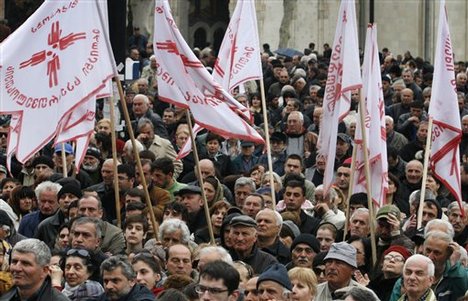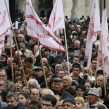
European Envoys Trying in Vain to Reason With Opposition in Tbilisi
Publication: Eurasia Daily Monitor Volume: 6 Issue: 82
By:

The European Union’s Special Representative for Moldova, Kalman Mizsei, has made notable headway in brokering a dialogue between rival political forces in an incendiary post-election situation. The EU’s High Representative for the Common and Security Policy, Javier Solana, visited Chisinau on April 25 to endorse the political document that his special representative mediated there. On April 27, Ministers of Foreign Affairs Radek Sikorski of Poland and Frank-Walter Steinmeier of Germany announced their intention jointly to help defuse the political standoff between Ukraine’s president and prime minister.
The situation in Georgia also requires EU involvement on a higher level and with a more credible message than has hitherto been the case. Just, the radical extra-parliamentary opposition in Tbilisi -40 kilometers from the Russian armored force spearheads- is now poised to switch from "peaceful" tactics to calculated low-level violence, which (judging from Georgia’s experience) could escalate beyond control (EDM, April 28). Laying siege to government institutions and plunging the capital city into chaos since April 9 could not reasonably be defended as peaceful tactics, but the bar has been set lower for the opposition and higher for the Georgian government to pass this test.
"For the sake of democracy, the government is tolerating many phenomena that Western European governments would not have tolerated," Parliamentary Chairman Davit Bakradze has told the assembled European ambassadors. "[Let] the population watch the developments with their own eyes and without restrictions and draw conclusions for themselves" (Rustavi-2 TV, April 25).
Western ambassadors stationed in Tbilisi have exerted every effort to bring the radical opposition into dialogue with the government. The ambassadors bent over backward to treat the radical leaders deferentially and never to criticize their excesses. But they could not persuade the radical leaders before April 9 to desist from starting the confrontation in the streets and cannot persuade them now to move to the negotiation table. This situation requires EU involvement on a higher level and with a more credible message than has hitherto been the case.
President Mikheil Saakashvili and parliamentary leaders had offered a dialogue long before the start of the current wave of demonstrations and persist with the offer, both publicly and through the Western ambassadors’ mediation. Meeting with the ambassadors on April 25 Bakradze reconfirmed the agenda for dialogue: strengthening parliament’s powers and its oversight functions vis-à-vis the executive branch, amending the electoral code so as to increase the opposition’s parliamentary representation, steps to restore political confidence, and agreement on a program to overcome the economic crisis.
European envoys are increasingly concerned and frustrated by the opposition’s strategy of confrontation. French ambassador Eric Fournier declared, "Because of the [opposition’s] activists, the parliament chairman must hold meetings at a hotel, not in the parliament building. We regret that some people have decided to act against the law and violate the democratic constitution. It is inadmissible that we should gather at a hotel to meet the chairman of the parliament. This is a lamentable fact" (Rustavi-2 TV, April 25). The Council of Europe’s Parliamentary Assembly Secretary-General Terry Davis told the opposition that "any issues should be discussed in negotiations, not in the streets;" and reproached it for having refused to take up their parliamentary mandates after the 2008 elections (Rustavi-2 TV, April 28).
Opposition leaders, however, demand Saakashvili’s resignation and the holding of general elections (only one year after the last elections). They denounce the "criminal Saakashvili regime," as they have done continuously since 2007, and insist that a dialogue should only pertain to the modalities of resignation and early elections (Imedi-TV, Public TV, Kavkas-Press, April 25-28).
Unaccustomed to and intolerant of European criticism, some opposition leaders bristle in response. One of them, French-born diplomat Salome Zourabichvili, felt duty-bound to apologize to the crowd at the rally over Fournier’s remarks; and she retorted to "Davis or any Englishman" that their call for dialogue was like "dialogue with Hitler" (Rustavi-2 TV, April 28). Other opposition leaders, parochial and unfamiliar with European institutions, imagine as "Conservative" leader Kakha Kukava told the crowd, that Europe will pressure Saakashvili into a dialogue about resignation (Rustavi-2 TV, April 25, 27).
The authorities adhere to the policy of non confrontation, no physical contact with the opposition in the streets, and openness to dialogue toward a political agreement with opposition groups. Saakashvili called for such dialogue most recently in his April 23 speech at a factory outside Tbilisi and his April 28 remarks in the city, following a special church service convened by the head of the Georgian Orthodox Church, Catholicos-Patriarch Ilia II. The Patriarch had publicly appealed to opposition leaders to attend the service; but they did not seem to be on hand, with the exception of Alliance for Georgia leader Irakli Alasania, who accepted to shake the president’s hand (Imedi TV, April 28).
Alasania, with his small personal following, is attempting to stake an elusive middle ground between the radicals and the authorities. The radicals do not regard Alasania as one of their own and have treated his attempts at mediation as scornfully as they have the European envoys’ efforts. Alasania attended and addressed the opposition rallies during the first phase after April 9, but seems to have dropped out from the meetings and the limelight afterward. The opposition’s field has narrowed and the most radical elements now have that field all to themselves.




